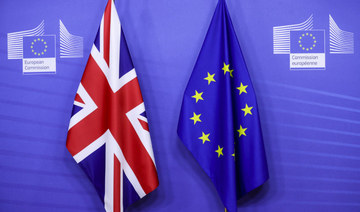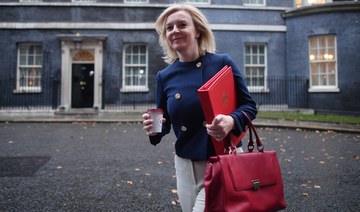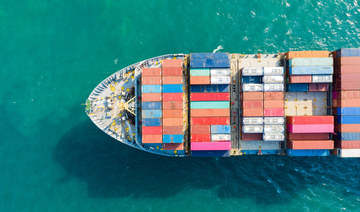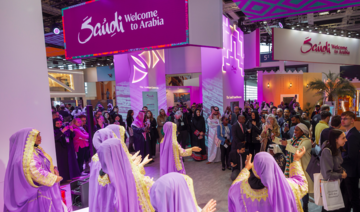LONDON: The UK government on Wednesday demanded the EU re-negotiate post-Brexit trading arrangements for Northern Ireland after rioting and business disruption hit the restive province.
The European Union has long insisted that it is up to London to implement what it agreed in their drawn-out Brexit divorce, and the US administration is also looking on warily at the UK maneuvers.
London stopped short of suspending the so-called Northern Ireland Protocol, which requires checks on goods crossing over from mainland Britain.
But Northern Ireland Secretary Brandon Lewis told parliament that while the UK had negotiated the protocol “in good faith,” its real-world application by the EU had entailed “considerable and continuing burdens.”
“Put simply, we cannot go on as we are,” he said.
Rather than ad-hoc grace periods for border checks, Lewis said the UK was seeking a “standstill period” for the protocol including legal action by the EU.
He pressed for a new dialogue “that deals with the problems in the round.”
“We urge the EU to look at it with fresh eyes and work with us to seize this opportunity and put our relations on a better footing.”
The protocol was painstakingly negotiated to avoid a hard border with Ireland, by effectively keeping Northern Ireland in the EU’s single market.
Northern Ireland, which suffered three decades of sectarian conflict until a peace agreement in 1998, has been rocked by violence this year, in part against the protocol.
Many pro-UK unionists see it as creating a de facto border in the Irish Sea with mainland Britain and say they feel betrayed.
In its proposals, Britain urged the EU to stop broad checks and focus more squarely on goods “genuinely” at risk of entering its single market via Northern Ireland.
The government insisted that for all other goods, a light touch was needed to preserve Northern Ireland’s integral status as part of the UK.
It also wants the removal of any oversight role by the European Court of Justice.
Frustrated at the new red tape since the UK left the EU fully at the start of this year, several UK companies have already suspended sales to Northern Ireland, or are offering a reduced choice.
Retail chain Marks and Spencer said that in the protocol’s current guise, there will be “gaps on the shelves” in Northern Ireland this Christmas.
In a phone call Tuesday, Prime Minister Boris Johnson told Irish counterpart Micheal Martin the protocol was “causing significant disruption” and changes were essential, according to Downing Street.
But the EU, seeking to preserve the integrity of its single market, says Britain has been acting in bad faith, knowing full well what it signed up to.
There was no immediate comment from Brussels, but European Commission president Ursula von der Leyen last week denied the EU was being dogmatic in its application of the protocol.
Ireland’s European affairs minister Thomas Byrne said Dublin would “listen carefully to what the British government have to say,” but insisted that any remedies must respect the hard-fought pact.
“We’re willing to discuss any creative solutions within the confines of the protocol,” he told BBC radio.
“But we have to recognize as well that Britain decided itself to leave the single market of the European Union, to apply trade rules, to apply red tape to its goods that are leaving Britain, to goods that are coming into Britain.”
The protracted rows over the protocol are drawing concern further afield from President Joe Biden’s US administration.
State Department spokesman Ned Price told reporters the administration wanted both sides “to negotiate within the existing mechanisms when differences do arise.”
John Kerry, Biden’s climate envoy and a former secretary of state, told BBC radio that the Irish-American president was “deeply immersed in the issue.”
Both he and Secretary of State Antony Blinken are “deeply committed in making certain that the (Good Friday) agreement holds and there is peace ultimately,” Kerry said.
UK demands EU agree to new post-Brexit deal for N.Ireland
https://arab.news/6w86c
UK demands EU agree to new post-Brexit deal for N.Ireland
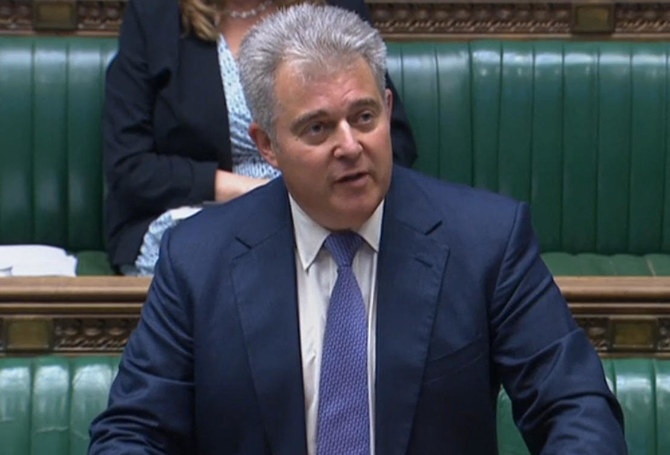
- European Union has long insisted that it is up to London to implement what it agreed in their drawn-out Brexit divorce
- US administration is also looking on warily at the UK manoeuvres
IsDB chief vows to support private sector in member states
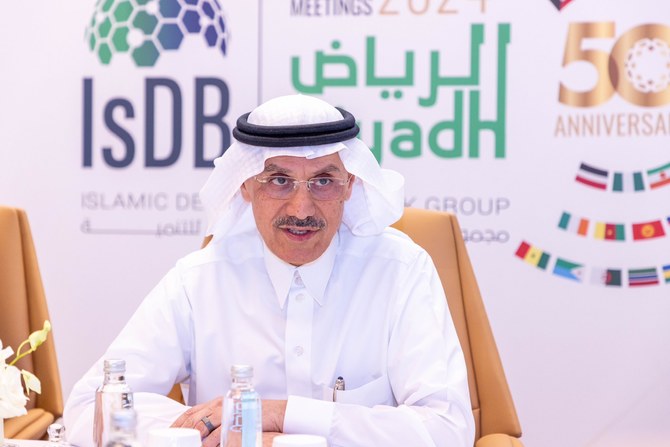
RIYADH: Since its establishment over 30 years ago, the Islamic Development Bank has supported its member states with $151 million in the form of investments and trade deals, said the top executive of the bank.
In his opening remarks at the 12th Private Sector Forum held on the sidelines of the 18th IsDB annual meetings in Riyadh on Sunday, the bank’s president, Mohammed Sulaiman Al-Jasser, said the financial institution has pumped in over $108 billion to support development projects in member states since its inception.
Speaking about the event, the IsDB chief said it offers potential investors an opportunity to network, exchange experiences, establish partnerships, and launch trade initiatives.
Al-Jasser said it is “a very good opportunity” to explore different opportunities and services provided by various IsDB institutions to support the private sector’s development.
He said the IsDB’s body to support the private sector in its member countries has initiated 451 projects worth $6.9 billion across various sectors such as the financial sector, agriculture, and energy.
“It has different investment operations in 50 countries. In 2023, it focused on supporting small and medium enterprises in member states,” Al-Jasser said.
He said the International Islamic Trade Finance Corp. was established in 2008 and has been supporting member states since then with financing facilities. “In 2023 alone, it issues loans worth over $75 million.”
The IsDB president said the bank strongly believed in supporting the private sector in member states.
Al-Jasser went on to say that the IsDB has “also signed many agreements and conventions to make use of the opportunities in the field of investment and trade” in member states.
The annual meetings coincide with IsDB’s golden jubilee, as the institution celebrates 50 years of promoting economic and social development in 57 member countries, under the slogan ‘Taking pride in our past, shaping our future: authenticity, solidarity, and prosperity’ that reflects the bank’s legacy and future goals.
Finance ministers, financial institutions’ representatives, Islamic finance experts, private sector, and non-governmental organizations are participating in the meetings.
Among the annual meetings’ prominent events are the Governors’ Roundtable, the 18th IsDB Global Forum on Islamic Finance, the IsDB Group Private Sector Forum 2024, the Philanthropy Forum, and the Future Vision Symposium, reported SPA.
Discussions address pressing issues such as multidimensional poverty, South-South cooperation, and financing the Sustainable Development Goals.
Meanwhile, the CEOs of the bank’s entities will meet in a strategic session titled ‘Unlocking Economic Potential’ which reflects IsDB’s commitment to promoting economic growth.
Mawani announces first container shipment from Jubail Commercial Port to Riyadh Dry Port
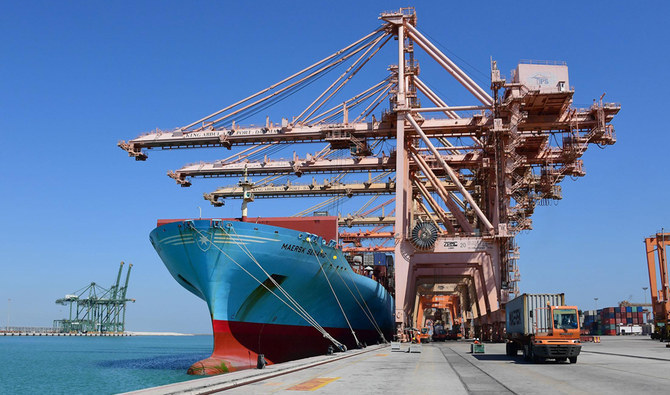
RIYADH: Saudi sea and rail transport links are set to be enhanced with the commencement of the first container shipment from Jubail Commercial Port to Riyadh Dry Port.
This voyage was made possible through collaborative efforts between the Saudi Ports Authority, known as Mawani, the Tax and Customs Authority, Saudi Railway Co., and Mediterranean Shipping Co., according to a statement.
Moreover, the containers were transported through the railway connecting Jubail Commercial Port and the East Railway network, carrying a load of 78 receptacles. The maximum cargo capacity for one trip on the railway is 140 standard containers.
This move falls within the framework of cooperation between Mawani and other concerned parties, especially SAR, which contributes to achieving integration in transporting crates, bulk materials, and general goods by connecting ports using trains.
This comes with the SAR networks linking the Riyadh Dry Port with King Abdulaziz Port in Dammam, King Fahd Industrial Port in Jubail, Jubail Commercial Port, and Ras Al-Khair Port.
This development adds a competitive advantage for these terminals and supports the growth of ship loading and unloading services.
“The launch of the first container shipment from the Jubail Commercial Port via railways to the Riyadh Dry Port and linking the ports to train networks will contribute to enhancing integration between sea and rail transport modes, raising the efficiency of logistical operations, developing the efficiency of exports and imports, and enhancing the competitiveness of the ports to consolidate the Kingdom’s position as a global logistics center in accordance with Saudi Vision 2030,” Minister of Transport and Logistics Saleh Al-Jasser said in a post on X.
Saudi Aramco and China’s Rongsheng explore JV in petrochemicals
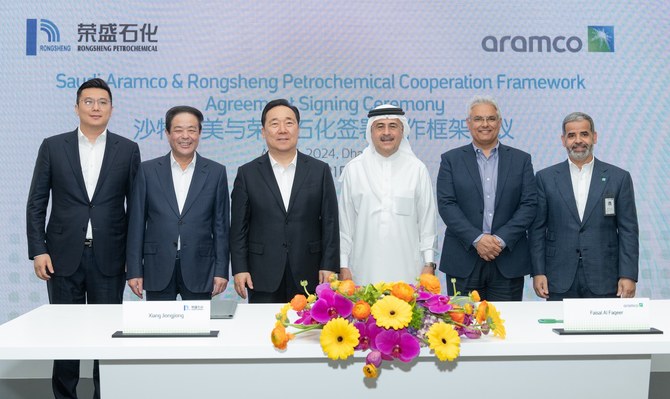
RIYADH: Saudi-Chinese investments are set to strengthen as Aramco explores a joint venture with Rongsheng Petrochemical Co. to advance its liquids-to-chemicals strategy.
According to a press statement, this joint venture is expected to be established in Saudi Aramco Jubail Refinery Co., also known as SASREF.
Located in Jubail Industrial City within the Kingdom, the facility currently processes crude oil into petroleum products with a production capacity of 305,000 barrels per day.
Rongsheng recently signed a cooperation framework agreement to explore the potential acquisition of a 50 percent stake in SASREF.
The agreement also lays the groundwork for the development of a liquids-to-chemicals expansion project at SASREF. Additionally, the press statement mentioned Aramco’s potential acquisition of a 50 percent stake in Rongsheng affiliate Ningbo Zhongjin Petrochemical Co.
Aramco Downstream President, Mohammed Y. Al-Qahtani, said: “These discussions highlight our ambition to advance our liquids-to-chemicals strategy with strategic partner Rongsheng, both in the Kingdom of Saudi Arabia and China.”
He added: “In building on our existing relationship, we aim to advance our expansion in a key geography and attract new investment to the Saudi downstream sector.”
In July 2023, Aramco acquired a 10 percent interest in Rongsheng through its subsidiary Aramco Overseas Co., based in the Netherlands.
Rongsheng, in turn, holds a 100 percent equity interest in ZJPC, which operates an aromatics production complex and expresses interest in a joint venture focused on producing purified terephthalic acid.
Earlier in April, Saudi Aramco disclosed that it is in talks to acquire a 10 percent stake in China’s Hengli Petrochemical, aiming to strengthen Aramco’s growing downstream presence in the Asian country.
In a statement, Saudi Aramco mentioned signing a memorandum of understanding for the proposed transaction, pending regulatory approvals.
Qatar launches national strategy to boost renewable energy mix

RIYADH: The use of solar power and other renewable energy sources is set to boost with the launch of a comprehensive strategy by the Qatar General Electricity and Water Corp.
The utility, also known as Kahramaa, formulated the Qatar National Renewable Energy Strategy to add renewable sources to its energy mix.
The initiative, developed in coordination with 22 key energy actors, aligns with Qatar’s commitment to a sustainable future and the goals outlined in the Qatar National Vision 2030 and the Third Qatar National Development Strategy 2024-2030, according to a report issued by Qatar News Agency.
With the annual production of more than 2,000 kilowatt hours of solar power per square meter, Qatar is one of top countries with the highest potential for producing this clean form of energy.
As per the strategy, Qatar aims to expand its renewable power generation capacity to approximately 4 gigawatts by 2030, with distributed solar generation contributing around 200 megawatts.
This distributed approach will decentralize power generation, ease the burden on the centralized grid, and enhance the overall energy resilience of the nation.
The launch of the strategy marks a crucial step toward redefining Qatar’s energy landscape as it promises substantial economic, environmental, and security benefits.
The plan is projected to reduce the average cost of electricity generation by 15 percent by 2030 through cost-effective renewable solutions.
In terms of its environmental impact, the strategy supports the reduction of carbon emissions, targeting a 10 percent cut in annual emissions from the power sector and a 27 percent reduction in CO2 intensity per unit of electricity produced.
From an energy security perspective, diversifying power sources is crucial as the strategy emphasizes the importance of maintaining system reliability during the transition to renewables.
To this end, the strategy proposes a balanced mix of large-scale renewable projects and efficient thermal generation using natural gas.
Kahramaa’s responsibilities under QNRES include regulating renewable energy practices, issuing licenses, monitoring compliance, executing detailed deployment programs, managing stakeholder interactions, and supporting research and innovation initiatives.
Moreover, the utility company has begun accepting applications for accredited solar panels and inverters, setting the stage for a comprehensive rollout of distributed renewable energy systems.
The strategy also included the introduction of net-billing for distributed renewable generation, allowing prosumers to sell surplus electricity back to the grid at fixed prices.
This system employs bidirectional meters to measure both consumption and surplus electricity exported to the grid, with credits applied to consumers’ accounts to offset future consumption costs.
Vision 2030 and the evolution of Saudi Arabia’s hospitality sector

RIYADH: As Saudi Arabia embarks on its ambitious journey outlined in Vision 2030, the hospitality industry emerges as a pivotal player in the Kingdom’s economic diversification efforts.
The sector continues to evolve, with a focus on attracting international visitors and enhancing domestic tourism experiences.
In 2023, the Kingdom’s travel industry not only met but exceeded expectations, experiencing a staggering 58 percent growth in passenger arrivals. This prompted a substantial recalibration of its Vision 2030 ambitions.
Last year, Saudi Arabia increased its annual tourism target to 150 million visitors by 2030 after surpassing the original goal of 100 million, seven years ahead of schedule. This achievement was attributed to the country’s ongoing investment in infrastructure, tourism transformation, hospitality, and real estate, aligned with its vision objectives.
Through capital allocation in the tourism framework, promotion of cultural heritage, and encouragement of innovation in the hospitality sector, the nation aims to unleash the Kingdom’s tourism potential and establish the region as a premier global destination.
Since Saudi Arabia opened its doors to non-religious tourists for the first time in 2019, the service and accommodation industry has been infused with new life.
With the announcement of a variety of hotels, resorts, and tourist attractions, the sector is positioning itself to meet the growing demand.
To achieve this, the Kingdom aims to increase its hotel room inventory by 315,000, projecting a development expenditure of around $37.8 billion by 2030. This expansion will bring the overall inventory to nearly 450,000 rooms.
David Vely, the vice president of development for the Middle East and Africa at Club Med, emphasized that experts in the field have witnessed firsthand Saudi Arabia’s ongoing efforts and investments to fulfill the criteria needed to meet its destination development and tourism targets.
He said: “Firstly, world-class infrastructure, including international airports and an advanced highway network, is crucial to facilitate tourist travel. Secondly, a variety of tourist attractions — from historical sites and beautiful beaches to modern entertainment centers — are needed to attract visitors. Thirdly, quality service and memorable experiences, coupled with professional and warm hospitality, are essential to retain tourists and foster positive word-of-mouth.”
Vely added: “We have observed Saudi Arabia’s ongoing efforts and investments to successfully fulfill these three criteria and are confident in its ability to achieve — and surpass — the ambitious goals of Vision 2030.”
Alongside investments in tourism infrastructure, which encompass transportation networks, airports, roads, and recreational amenities, initiatives such as NEOM, the Red Sea Project, and Qiddiya are expected to further bolster the nation’s hospitality sector.
In September, NEOM’s mountains destination, Trojena, revealed plans to host two Marriott hotels — a JW and a W. These establishments are among the numerous international inns set to open at the artificial ski retreat, which is slated to host the Asian Winter Games in 2029. The resort is scheduled to welcome visitors and new residents in late 2026.
Meanwhile, Red Sea Global, the visionary developer wholly owned by Saudi Arabia’s Public Investment Fund, boasts a portfolio that includes two world-leading destinations announced by Crown Prince Mohammad bin Salman: The Red Sea and AMAALA.
Collectively, these developments aim to enhance Saudi Arabia’s luxury tourism and hospitality sustainability offerings, with a focus on protecting the natural environment and enhancing it for future generations.
Emphasizing the importance of environmental awareness in the hospitality sector, Shahbaz Tufail, the executive vice president of DAR Engineering, noted that it is “crucial” to incorporate sustainability into new undertakings.
“The ongoing development of new entertainment options, as well as aligning value and service propositions to the international travel palette, clearly demonstrates the intent of Vision 2030. To appeal to a broader audience, providers must align with global hospitality and travel trends such as ecotourism, wellness, smart hotels and sustainability,” he said.
As a cornerstone of the sector’s development, both Vely and Tufail further stressed the importance of training and education in attracting and retaining talent within the hospitality field.
In order for this to happen, the industry needs to offer competitive compensation and benefits packages to attract skilled professionals into hospitality, and invest in training programs to develop new talent and up-skill existing team members, as noted by Ramine Benham, vice president of development at Minor Hotel EMEA.
“Collaboration with educational institutions to offer internships and graduate training programs, as well as vocational training programs can also help in providing a pipeline of future talent. By implementing these measures, the hospitality industry will be able to ensure that they employ the best talent and furthermore retain these loyal individual,” he added.
The nation has already begun to take strides in this direction, with the announcement of multiple programs and initiatives.
In September of last year, the country’s Minister of Tourism, Ahmed Al-Khateeb, declared the opening of the Riyadh School for Tourism and Hospitality during the 2023 UN Tourism “World Tourism Day” celebrations in Riyadh.
Inaugurating the launch, Al-Khateeb said: “This school is a gift from the Kingdom of Saudi Arabia to the world because it will be open to everyone to enjoy the best training in tourism and hospitality.”
This initiative aims to revolutionize industry education by attracting the brightest minds and leveraging cutting-edge technologies in an innovative facility.
Similarly, in April, a partnership was announced between the Kingdom’s Ministry of Tourism and UN Tourism for the launch of a six-month training program tailored for institutions in Saudi Arabia specializing in the sector.
TedQual, a certification system designed by the body to evaluate a series of universally applicable criteria, will help further enhance the quality and training of relevant organizations in Saudi Arabia.
The UN-backed tourism education scheme is poised to elevate the training of Saudi workers, enabling them to deliver the best international standards in the Kingdom.
As the nation gears up to host Expo 2030 in its capital, talent retention becomes imperative to meet the anticipated surge in hotel occupancy rates, with both international and domestic travelers seeking accommodation during the bustling period.
Furthermore, the forum represents a transformative opportunity for Saudi Arabia’s hospitality sector, driving growth and investment.
“Investors are drawn to opportunities in hotel development and resort projects due to the sector’s potential for substantial returns on investment,” Vely said.
“Moreover, a thriving hospitality industry enhances the country’s overall attractiveness as an investment destination, strengthening confidence among foreign investors and contributing to the country’s economic growth and diversification efforts,” he added.
To support the sector’s growth, investment, and attractiveness, Riyadh is poised to host the Future Hospitality Summit, which will focus on the future of successful hotel and destination development in the Kingdom as part of the event’s agenda.
The forum, scheduled to take place from April 29 to May 1, will discuss key factors affecting tourism development and explore strategies for overcoming potential challenges to ensure government targets are met.



